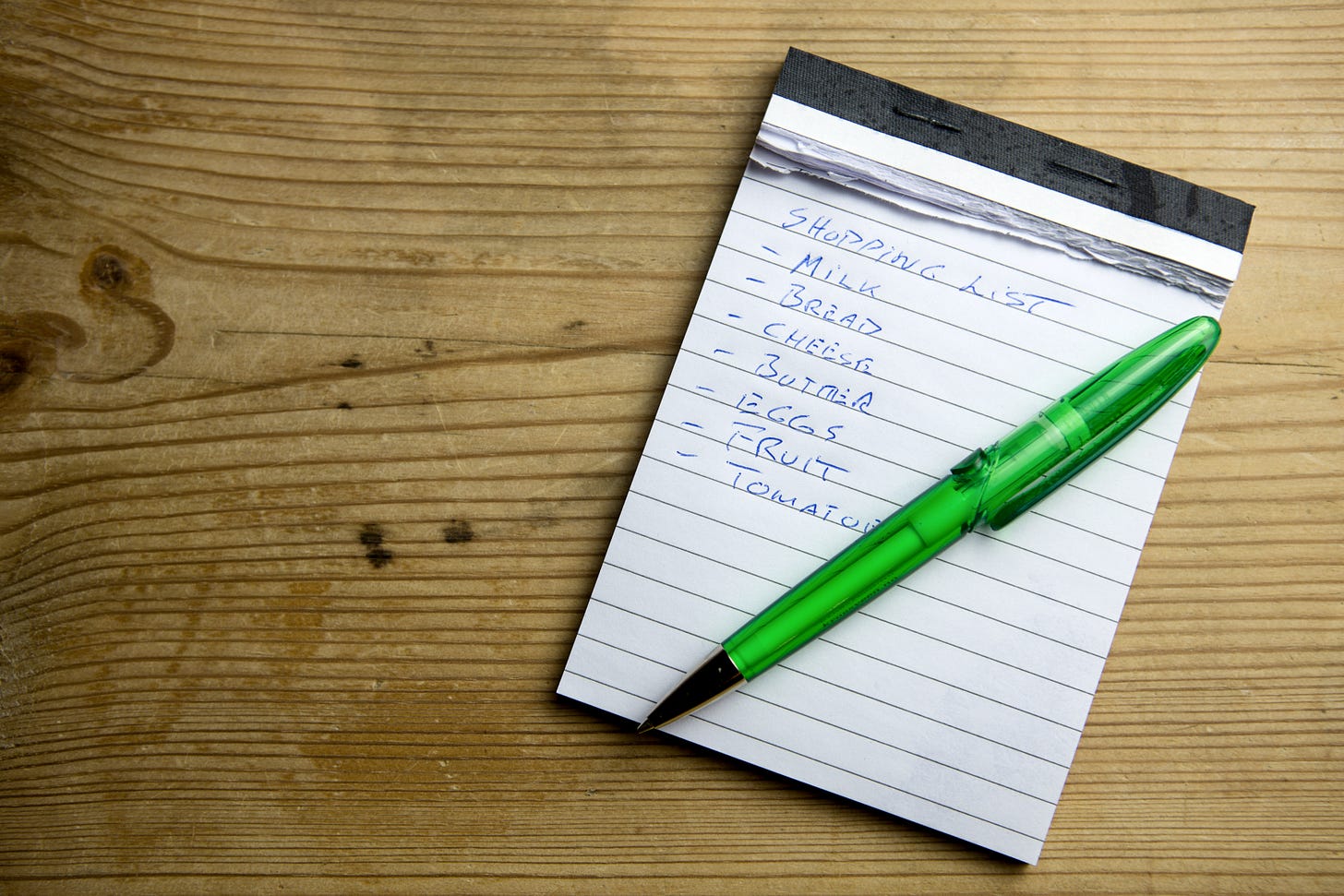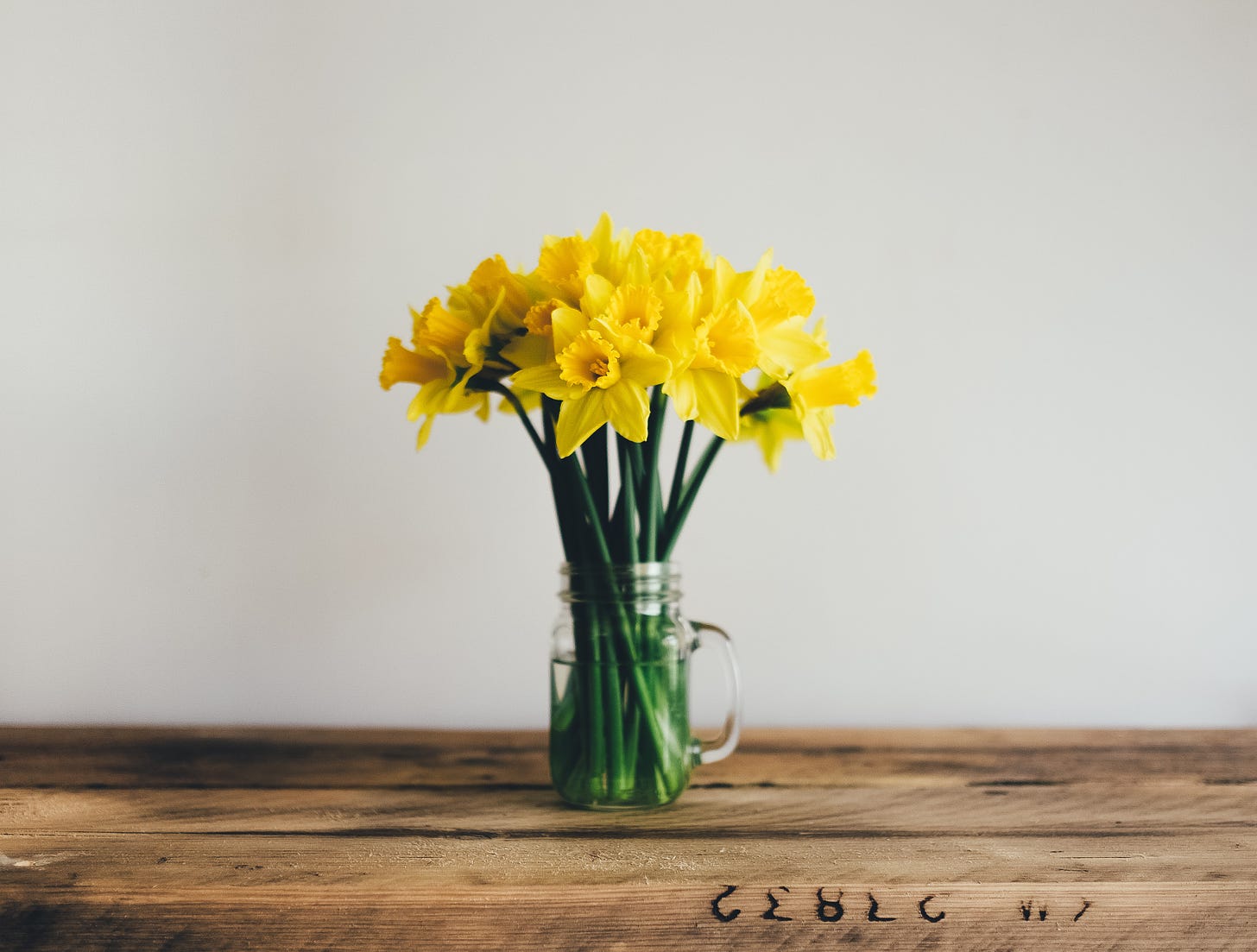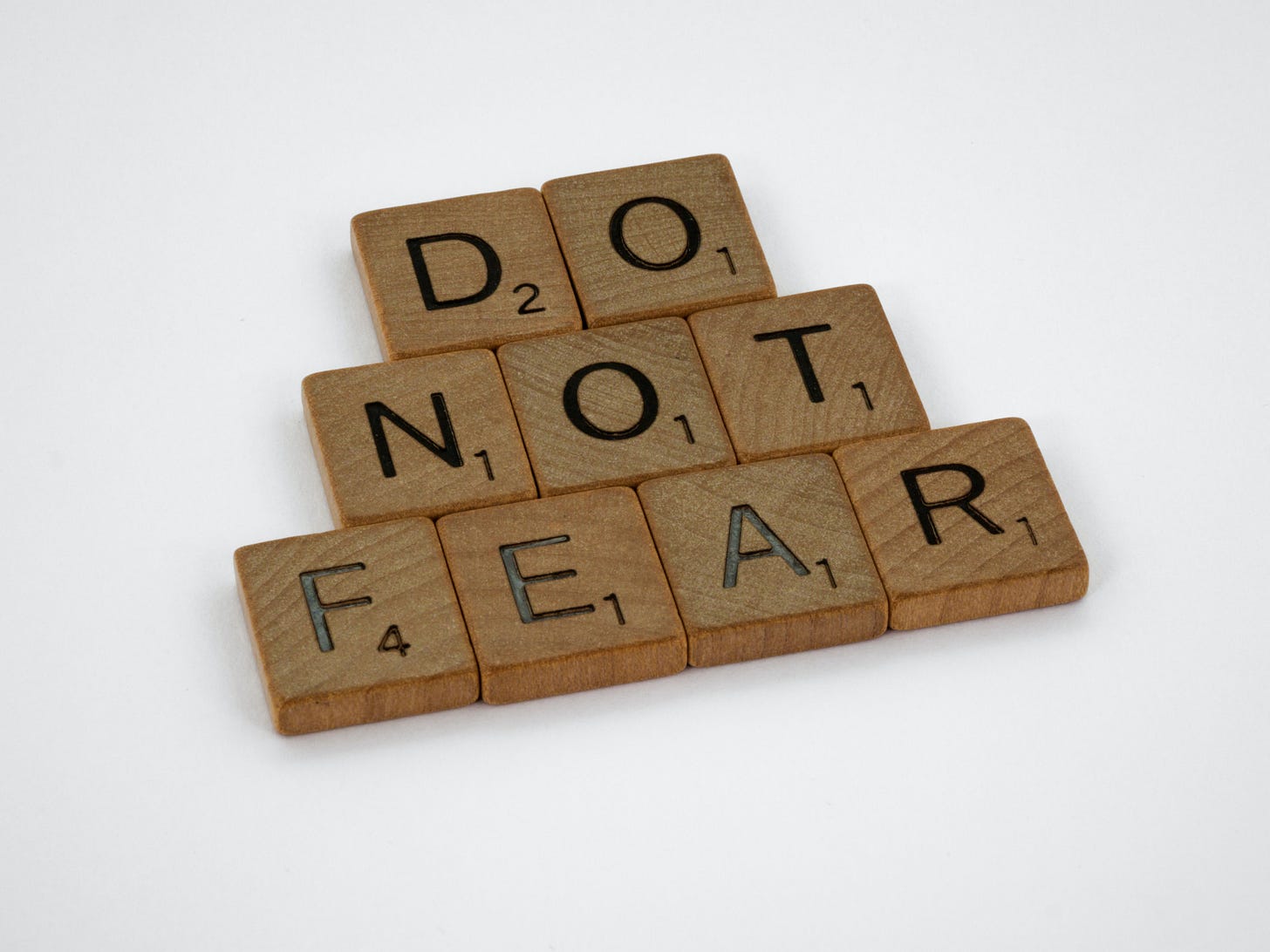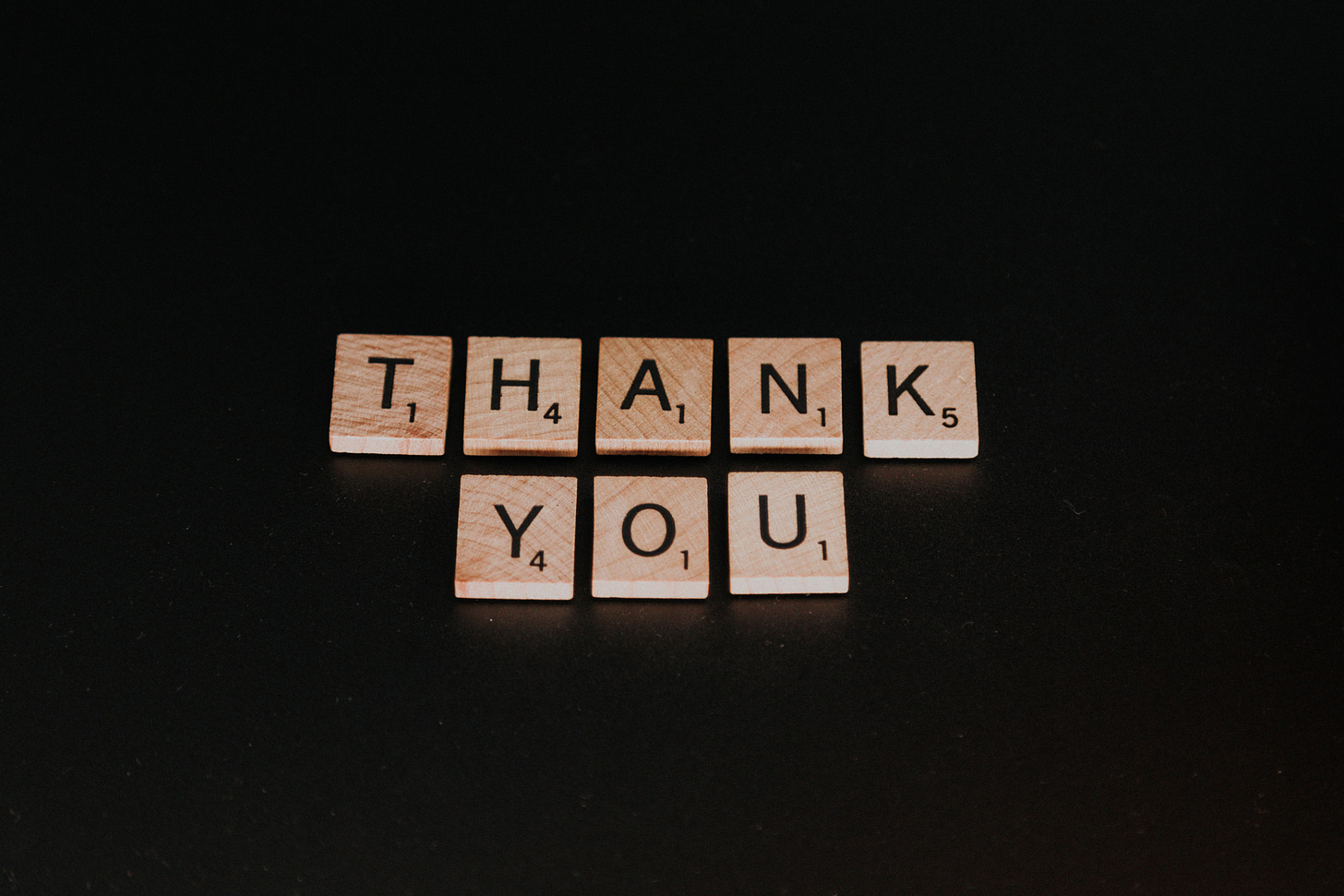If you are looking for a last-minute gift idea, consider a paid subscription to Hello, Adversity!
A paid subscription provides access to behind-the-scenes audio recordings and additional future benefits. Your support also helps me keep this newsletter going, which means the world to me. Thank you for your support!

Now that it’s almost the end of 2023, I am going to do something that, to my knowledge, no one has ever done before.
I’m going to reflect on the past year and make a list.
(I see you rolling your eyes over there.)
I know, I know. End-of-year list-making is common practice these days. Even though these end-of-year roundups are sometimes corny and cliché, I’ve found that every once in a while, I come across a list that is both entertaining and informative.
That’s my goal for today.
By sharing my list of 23 things I’ve learned, discovered, and appreciated in 2023, I hope that you’ll learn something new and find a few reasons to laugh. (Or at a minimum, learn something new.)
Without further ado, let’s get started!
Our music for today is brought to you by Saxophone Santa.
23 things I’ve learned, discovered, and appreciated in 2023
1. Learned: Why it’s important to pay off our “emotional debt”.
Back in August, I read this insightful article by Jonny Miller about the concept of “emotional debt”.
When we experience a traumatic event or intense stress, we often repress our emotions in order to confront the challenge at hand. The problem is, we often never get around to reckoning with these suppressed feelings and paying off our accumulated “debt”. Instead, our emotions simmer below the surface until they boil over at a later time, which can wreak havoc on our physical and emotional well-being.
When I read this article, I immediately thought back to 2013, when I failed to adequately process several traumatic events that happened that year. It took many months of suffering before I paid off my emotional debt and honestly confronted what had happened.
2. Discovered: The writings of William Zinsser.
William Zinsser was a long-time writing professor at Yale University, literary critic, and columnist for the New York Herald Tribune. In September, I stumbled upon his book On Writing Well and absolutely loved it. His candid tips for writing compelling nonfiction are both practical and, in many instances, hilarious. I constantly reference his advice on sentence construction and grammar. (Although he’d balk at my incessant use of adverbs.)
I am about halfway through another one of his books, Writing About Your Life, which explores how to write your personal story in an engaging, insightful way. Zinsser weaves in entertaining stories from his own life to help illustrate different concepts. I’m really enjoying it so far.
3. Learned: The Memory Dividend.
I first read about this framework in Sahil Bloom’s “Friday Five” newsletter.
A memory dividend is the joy we get from reliving experiences over and over again. It’s a simple concept, but it’s helped me reframe my decision-making in a new way, especially when it comes to travel. Even though traveling with a disability is stressful, the ability to cherish memories for the rest of my life has given me the push I need to say yes to experiences I might have otherwise turned down.
4. Appreciated: Being an amateur.
In his book, Show Your Work!, author
celebrates amateurs and the enthusiasm they bring to their given pursuits. Amateurs are eager to learn and are not afraid to make mistakes. Amateurs are willing to be authentic and put themselves out there, and in doing so, they find others who share similar interests.I had never considered the benefits of being an amateur, so this was a nice perspective shift.
5. Learned: The Hemingway Bridge.
When Ernest Hemingway finished a writing session, he would always leave a few sentences of his story unwritten so that he could pick it up the next day without losing any momentum. He only stopped when he knew exactly what came next.
When I learned about this concept in Tiago Forte’s book, Building a Second Brain, I immediately thought about how it could be applied to other areas of my life, in addition to writing. I’ve found that this technique works great for any complex project or task that spans multiple sessions. By stopping before I’m finished, and mapping out what my first task will be the next day, I can break through procrastination.
6. Learned and Discovered: How to make an audio recording.
Appreciated: How difficult it is to make an audio recording. (At first.)
I was going to use the Substack audio embed feature for my weekly audio recordings until
told me about Audacity, a free recording and editing app. It took a little while to get used to, but once I figured it out, it was a lifesaver! Instead of melting down and dropping 50 f-bombs every time I stumble over a word, I can simply redo the take and edit out the mistake afterward. Much easier!7. Learned: 50% of all free stock photos fall into one of three categories:
a) random arms

b) inanimate objects on wooden tables

and my favorite:
c) making words out of Scrabble tiles

That said, I wholeheartedly appreciate these sites and the photographers who take these photos. I barely know how to use my iPhone camera let alone take professional shots. They save me from having to use my headshot in every article.
8. Learned, Discovered, and Appreciated: The difference between impossible and very hard.
Okay, so some things are truly impossible. But most things? They are possible, it’s just really hard to accomplish them.
This distinction has helped me stop being so fatalistic about things. For example, there’s a difference between “I’m never going to be able to live in Boston again” and “I can technically do it, but it will take a lot of advanced planning.” Every time I fall into a rut and want to think something is impossible, I ask myself if that’s truly the case. More often than not, I see that it is possible, even if I don’t yet know the steps involved. This infuses me with just enough hope to keep searching for a solution.
9. Appreciated: Breaking things down into smaller parts.
I am terrible at biting off more than I can chew, but this year I have gotten better at breaking things down into simpler steps. No task is too small to build momentum, especially when I can cross it off my to-do list, which is a great feeling! (Reminds me of that time I saw someone on TV make a to-do list and their first task was “Make a to-do list.”)
10. Learned: When writing a memoir, start with individual scenes.
There are many ways to write a memoir, but this list-making technique helped me break through a multi-year writer’s block. The technique starts with writing down various memories that come to mind, in any order, then turning this list of memories into scenes. Once you’ve written the scenes, then you organize them into a narrative.
Using this new approach, I rewrote my memoir from scratch. What was once 700 pages is now 150 pages. There’s still more to add but it is much less bloated, and I’m looking forward to shaping it into a finished product!
(On a related note, if I knew you between 2008 and 2016, I probably edited you out of the book. My apologies.)
11. Appreciated: You can teach an old dog new tricks.
This year, the National Basketball Association (NBA) and Major League Baseball (MLB) instituted new changes that significantly improved the quality of play in each league.
The NBA in-season tournament, modeled after European soccer, brought instant excitement to what was otherwise a dreary part of the regular season schedule. (Although the court designs are absolutely hideous.) The MLB, meanwhile, instituted a pitch clock which cut down game times by nearly 30 minutes. No more pitchers stepping off the mound every ten seconds to spit and “make adjustments”.
I was pleasantly surprised by both changes, despite my initial skepticism. These changes teach a valuable lesson — we shouldn’t be afraid to change, even if we’ve been doing something the same way for a long time.
Speaking of…
12. Appreciated: The importance of taking risks.
I left my job in August, after considering taking this step for many years. Even when a risk is the right decision, it can still feel scary. Now that it’s been almost four months, I can confidently say I made the right decision, even if I didn’t achieve every goal I set out for. (Case in point: I will need to find a job again after the new year.)
I took my shot, which helps me sleep at night.
13. Learned, learned again, and am still learning: Being succinct.
In the early days of Hello, Adversity, I’d write 3-4,000 word posts without batting an eye, which was a pain to both read and edit. Over the course of the year, I’ve gotten much better at cutting down the length of my posts, and when necessary, breaking them into multiple parts.
Brevity is the soul of wit. Long-windedness…..isn’t.
14. Discovered: Ali Abdaal.
I really enjoy Ali Abdaal’s YouTube channel on productivity, which I discovered in August. I’ve learned about several books from watching Abdaal’s videos, including my current read, The E-Myth Revisited.
15. Appreciated: Having a purpose.
My disease is difficult to deal with, even on my best days. I’ve always had a strong sense of purpose, but this year, I feel like I’ve made significant progress in actualizing this purpose, which has given me a newfound appreciation for why I’m on this earth and what I’m supposed to be doing with my life.
I don’t take this for granted. Without purpose, I don’t know where I’d be.
16. Discovered: A simple planning philosophy.
When I read this quote by Derek Sivers, “The best plans allow you to change your plans” it was an a-ha moment for me. Having a plan is great; flexibility is even better.
17. Appreciated: Less is more.
I always want to say yes to every new opportunity, but when I spread myself too thin, nothing gets done. As much as it goes against my natural inclination, doing one thing at a time is the most productive approach over the long term. I have learned to appreciate the power of focus, even if I rebel against it every day.
18. Appreciated: Hidden Genius.
’s debut book, Hidden Genius, was one of my favorite reads of the year. In the book, Polina explores different ways the world’s most successful and innovative people have tackled complex problems, taken career risks, overcome adversity, and ultimately, unlocked their potential.I feel like I highlighted the whole book!
19. Learned: The perils of “Zero points for winning”.
“Zero points for winning” comes from Bill Walsh’s book, The Score Takes Care of Itself. Walsh was the former coach of the National Football League (NFL)’s San Francisco 49ers, where he won three Super Bowls over his ten-year career.
Most coaches of Walsh’s caliber have careers spanning multiple decades, but Walsh was only able to coach for ten years before he had to retire. Why? Because he was no longer able to enjoy winning. For Walsh, winning was something he expected to do. When his team won, he nitpicked their performance, which sapped his joy. When they lost, it tore him to pieces, making him physically ill. Eventually, this mindset took a devastating toll on his health and he had to step away from the game.
Walsh’s story is a cautionary tale, a reminder to celebrate our victories and enjoy the good times.
20. Appreciated: Consistency and loving the process.
This year, I have kept to a consistent writing schedule for the first time in my life.
The result? I am beginning to see the fruits of my efforts grow and compound over time. I have learned to love the process, even if the payoff isn’t immediate. In many respects, the process IS the payoff.
21. Learned, Discovered, and Appreciated: The misery of quote attribution.
Many times I’ve wanted to use a quote, only to get confused by who said it. One site attributes a quote to Eleanor Roosevelt; another site says it was Nelson Mandela. One site says Albert Einstein; another Buzz Lightyear.
I never want to misattribute a quote, but I’ve come to appreciate that perfect attribution is often impossible. We just have to do the best we can.
22. Appreciated: Finding community here on Substack.
Substack has its good and bad days, its pros and cons, but one of the joys of the platform is meeting other writers, trading emails, and building a community of like-minded creators. There are too many writers to list — and I know I’ll forget someone — so I’ll just say that I appreciate all of you! You know who you are.
23. Appreciated (and continue to appreciate): YOU the reader.
When I began Hello, Adversity in January, I thought my readership would consist of my mom and hundreds of email accounts I’d have to create to boost my subscriber count.
Thankfully, real people have subscribed to this newsletter. (I’m giving you the benefit of the doubt that you’re not a bot.) You have given me permission to appear in your inbox every week. You take the time to read my posts and leave a comment. You sustain me on the days when life grinds me down.
All I can say is:

Here’s to a happier, more sane 2024!
Chris





Agree, here's to more f-bombs! Wishing you a merry one and thank you for this wisdom and these reads! Looking forward to more in 2024. 🤗
Chris, I think we need more f-bombs in your audio in 2024. 😅
But seriously, I adored this list. Your writing each week is always filled with gems, and distilling some of the best gems into this reference is a total delight!
So grateful to have met you, and discovered your wonderful writing, in 2023. 🤗